|
|

As Wide and as Deep
Claire Williamson has been leading writing
and drama workshops in Bristol as part of Small Island
Read 2007.
A selection of some of the poems and material written by her
students can be read elsewhere on this website and will be included
in the evaluation report, along with other examples of creative
writing that has grown out of this project. Here is one of Claire’s
own poems inspired by the Small Island themes.
You are a child
face open to the world
wide with potential
as the Atlantic Ocean.
Your ancestors have been sketched
written, documented
digested
and then perceived
by minds as small
as sugar grains.
You are a child
who will slowly be informed
that your wild-wind thoughts
your sun-drenched dreams
your vision
may be a little too passionate
too faraway
too luminous
for what is expected
and these hints will be transmitted
through smiling averted eyes;
pitiful cocked heads
that can only picture
people yoked like oxen;
the sound of waves
accepting those unwanted on voyage;
intimations made by people
with minds so small
there is no space for their ideas to lie down
and think.
But your face
is miles away
receiving ovation;
swimming in the Caribbean;
you have dreamt of a hundred closed doors
and opened them all in your sleep;
you are holding a child in your arms
face open to the world
telling them of your love and dedication
as deep as the Atlantic Ocean.
Small Island
Poem by Paula Worth from Cornwall
inspired by reading Small Island.
Small island,
Kaleidoscope of colours,
Hopes and dreams.
So much to give,
So much to lose in exploitation...
Another island,
Not so small,
The fight to keep her freedom
Has her back against the wall.
She sends the call to arms
Throughout the lands.
From far and near they come
Leaving hearth and home
To save the Mother Country...
Long years,
But now the battle’s done
And with the victory comes
Another challenge;
A land for heroes to create
For black and white
A brotherhood of man;
Where all may share with equal right.
And diamonds, rough or polished
Can hope to find their place
Within that plan.
But not so simple to replace
Mistrust, on either side.
Injustice, prejudice and pride
Can soon destroy ideals.
Careful men must watch and learn
Lessons of history discern,
Or soon this brave new world
Repeat mistakes,
And freedom found, again denied
As in oppression’s reign
They exchange one form of slavery
For other cruel chains.
The Colour of Money
'A devout Christian, Curtis
was asked not to return to his local church, for his skin was
too dark to worship there' – page 326
This sentence reminds me of a module I studied as part of my
degree. The course reflected the growth of religious diversity
in post-war Britain and examined the rise of ethnic religions
and, amongst other things, their acceptance into our society.
Sadly the British, at this point in time, were largely unfamiliar
with first-hand experience of living with people from other cultures
and relied upon the written word and impressions provided by
our empirical pioneers. Acceptance into our established Christian
places of worship was lacking, regardless of any alleged breaches
of the law. Thus migrants from countries such as Jamaica were
forced to practice their religion, Christian I believe, in their
own front rooms, or pay for the hire of public rooms in which
to worship. In some cases unused church buildings were rented
or sold to ethnic groups for worship, owing to failing church
attendances of British
worshipers.
Wasn't it the British and other European nations who were happy
to invade new world countries, to take control and enforce our
ways upon them? Didn't we seek to tame their so called heathen
ways to a more civilised way of life? Happy for Jamaica to be
part of our Commonwealth, to fight for us in the Wars, to take
their money. Why then not to worship in our churches the same
doctrine we sought to inspire their lives with. Is it any wonder
that elements of segregation continue to exist in our society?
Small Island is
a fantastic book full of humour and thought provoking issues
which highlight our mid-twentieth century repressive attitudes
towards foreign culture. My partner is Jamaican and I took pleasure
in superimposing the character of Gilbert on to his body, in
order to give me an image to focus upon. They share many traits.
Carol
Chalk, Shaftesbury, Dorset
“I really enjoyed this book. Having
been born in the early 1950's I could recall events such as
the ones I read. I remember growing up in an all white area
and being intrigued at the sight of the few coloured people
I met. In my late teens when I worked and met some of these
coloured people socially I was appalled at their treatment,
particularly in work places when bosses would refuse to give
jobs to them regardless of their qualifications. It is worth
noting that an Irish friend of mine who arrived in England
around the same time remembers lodgings displaying signs saying
'no blacks, no dogs, no Irish.' We also had Catholic neighbours
who many treated as aliens because of their faith. This prejudice
works both ways though. Reading the book it made me feel sad
that we are still seeing different races not trying to understand
each other and live together in love and respect.”
Survey
response
“I thought it was a great book,
and about time that somebody from the community should 'document'
what went on in the past. I am close to 50 yrs old, born in
Tottenham and I clearly remember always wondering that every
time I went shopping with my parents how people would come
up to me in the street (I must have been 3-4 yrs old) and make
a fuss of my hair, my skin, and my colour. But there was always
when in white company, that I should be silent and only speak
when I was spoken to.”
Survey response
This story is about black
GIs in Bristol was sent in by Samantha via the Small
Island Read
2007 website.
I am part way through Small Island. I have got
to the bit where there is a riot at the cinema. I felt very moved
and disgusted to read about segregation in WWII in our own country
of American troops. I wondered whether this was a big issue for
the British government of the time or did
they just leave the US troops to themselves. My question was
how could we allow this to happen?
I would like to share a memory that my grandma
shared with me. I am in my 30's now but she told me this when
I was small and it has stuck with me since. The readers' guide
mentions a riot at the bottom of Park Street
between black and white GIs so this memory has even more poignancy
for me now.
She was walking in Queen's Road, Bristol with
her Dad. She was a young woman at the time. A couple of black
GIs were walking along towards them on the
same pavement but they then stepped out onto the street and crossed
over. This, it seemed, was the norm. Black GIs always crossed
or stepped out into the road even when there was plenty of space
on the pavement to pass. But her father shouted out across (in
a Bristolian accent) 'yer what you crossing the road for? You're
in our country now and you don't have to do that here.' He was
very angry at how they were treated.
When I recall this story I feel proud that my
ancestors stood up in a small way for injustice and have instilled
in me a sense of tolerance and acceptance of others. I feel proud
that Bristol gave a temporary home to GIs during the war but
also really sad to know that prejudice existed and still does.
When I myself am intolerant of others this family anecdote helps
me.
My gran also remembers the GIs stationed around
Wraxall/Tyntesfield with affection as mentioned in the readers'
guide because she worked on the buses with her route up that
way.
Louisa Adjoa Parker is currently
working on a black history project exploring the history of black
and Asian people in Dorset over the past few hundred years. This
will lead to a book, exhibition, and learning pack for schools.
Louisa is a writer and poet of mixed heritage, and wants to raise
awareness of the experience of black people in rural areas. The
following poems are from her forthcoming collection Salt-sweat
and Tears launched by Cinnamon
Press on 8 February.
Sometimes when I’m
making beds
or pressing hot creases into sheets
like a young girl’s secrets wrapped in paper,
while the smell of heated cotton warms the room;
sometimes I think, were it not for the sounds
of cars outside, and the television sets
like squat black beetles in each of the rooms,
the vacuum cleaner I drag behind me
like a reluctant dog being walked;
were it not for these –
I could be an African servant girl
brought back two centuries ago
from Jamaican plantations by a trader,
my master, his mulatto child in fact.
The view over Lyme bay, misty now,
is much the same as it must have been then,
the neatly trimmed hedges and lawns,
lavender beds and the red-earthed driveway
curling around flowerbeds like a slowworm, sleepy
in the heat; the rooms with their polished dressers,
curved legs and white lace mats, the sounds of birds,
the clock in the hall.
Little has changed here, up at the big house
with me, the servant girl, being treated jolly well
having praise heaped on me like spoonfuls of sugar
for washing clothes, or folding sheets well,
while I make beds and think I know
how the magpie they keep in the garden
wrapped in wire must feel,
bruising its black and white wings against the cage,
pretending I was born for this,
smiling and dusting and cleaning white people’s rooms,
with the smell of hot cotton warming my skin,
pressing hot creases like frown lines into sheets.
© Louisa Adjoa Parker
Oh, to be black in Dar-sett (Dorset)
and be stared at in the street -
differing degrees of stare according to my shade -
and have silence fall on me like cold rain
when I walk into a country pub
on a Sunday afternoon;
and be called coloured by people who think
they’re being politically correct,
and have to travel miles
to get my hair done
(or not, and feel I look like shit)
and have people think I’m OK
when they get to know me but still call black
people darkies
and text racist jokes to their friends;
and have people joke about my hair
and not be able to react or be accused of
having issues;
and have my children be taught at school
that the crayon for skin colour is pink,
and have racism swept like cake-crumbs under
a carpet, to gather dust, and grow
thick and furred with mould;
and be told that there’s no problem here
(there are no black people in Dorset
– there have never been, in fact)
and to count the other brown
faces I see, and feel my heart lift slightly
whenever I do
(and feel I may have missed out),
and have everyone think all black people are
footballers and rappers
and hear teenagers say stuff like
I really like black people, they’re pretty, they’re
nice.
© Louisa Adjoa Parker
Mulatto girl
See the mulatto girl walking
down country lanes and fields, her
head held high, her skin the colour
of caramel boiling on the stove. See her smile
in the knowledge she is not the first
to walk this green and pleasant
countryside, she has history stirring within her limbs.
she has Africa’s heat and England’s cold rain
pumping through her blood, her
DNA a beautiful mix of gene pools
scattered across continents, she is strong.
She shows Africa in a way the English hide.
She shows an eighteenth century master’s love for slaves.
She shows a slave’s contempt.
She shows twentieth century people brave enough
to cross a line made of different tones of skin,
to love in spite of hate.
See the mulatto girl walking
down country lanes and fields, her head
held high, her quadroon baby girls
held on her hips, her hair thick and frizzed, lips
half full, there are no
white men dressing her in robes and jewels,
but see her smile, see her sway, her head
held high as she walks.
© Louisa Adjoa Parker
Fiona Hamilton is a writer and drama practitioner in Bristol. Skinandi (2006,
Two Turtles Press) is a collection of her poems on the theme
of journeys and arrival, and the linking of past and present
in family history. The following two poems are reproduced here
with her permission.
Geography
Depopulation of the Scottish Highlands
We did it in Geography
Miss Jeffrey leaned over
more like a diva
than a geography teacher
smiled her lopsided lipsticked smile
and listed the reasons:
Unemployment
Lack of resources
Mechanisation
Education
Railways
My Mum did that
I said to Jean
- What?
Depopulated the Scottish Highlands
Got up one day
said That’s it
I’ve had enough
Caught a train
– Really?
No
Miss Jeffrey lost
her lopsided lipsticked smile
leaned over further
and warned
– You two
if you’ve got something to say
to the whole class
you shouldn’t be talking
My Mum did that
I nearly said
But I didn’t
I would have had to
list the reasons
and all I could think of
was a crowd of people
rushing for the train
racing for the border
© Fiona Hamilton
South
Mum’s Rs rolled out
like blue hills levelled
into back gardens, front gardens
patches of green, hedged,
her vowels fished
out of her throat
and caught at her tongue’s tip
parting her lips
no longer lingering
at the back of her mouth
sheltering from wind
or pattering like echoes of rain.
Not that I noticed –
to me, it was her voice
unique –
how she had always spoken.
But people remarked
after hearing her on the phone
how Scottish she sounded.
I didn’t realise
as if down the line
the Englishness was netted
and all that swam free
was the sound of her voice.
© Fiona Hamilton
The following extracts are from a group of Young People from
Afghanistan who worked with Bluecoat Arts Centre and Humberto
Velez for the Welcoming project commissioned by Liverpool Biennial: International
06, during the summer of 2006
“Whenever I go to play football and
they ask me where I am from, I say Afghanistan. They look at
me somehow. They think that Bin Laden is Afghani and we are all
like Bin Laden.”
“Can I talk about my wishes and hopes? While I’ve
been here, I have been everywhere. Like they took me to a few
places for a month, and I didn’t know where I was or who
I was living with. In the past five months I have been to five
cities and I didn’t know where I was. I never had time
to go to college or do anything. So how can I talk about my hopes
and dreams? I can’t go back to my own country because I’m
a minor and I don’t have anyone to look after me. As you
know, I should have someone to look after me.”
“I want to study and be an important person. Not like people
who drink and are drunk, and just hang around on the streets.”
“ I just want to tell everyone to believe us. We are all
in the same situation. Some of us have been through a lot, like
cousin Reza, and they didn’t believe them. They said Reza
was married with children, and how can he be? How can he be married
with children? He is only 15.”
“We had so many problems. Like when I was growing up the
Taliban came to power and we don’t know where they came
from. They ruled the country for six to seven years and they
just suppressed everybody. Like if someone stole an egg, they
used to cut their hands off and hang them from the ceiling and
tell other people to look and say ‘this is what happens
if you do this.’ It was horrible. We had so many problems.”
“I think we are just frightened to go out. If we have a
problem and we want to ask someone, well we just avoid doing
that. We just keep ourselves away from them. And that is not
good, if you can’t ask. And if they ask us ‘Where
are you from?’, they just look at us somehow.”
“I don’t need to be here because I haven’t
got any money, because we had lots of money, but we couldn’t
live there, there was nowhere to live. That’s why we left
Afghanistan. Even now if I know it is safe, I wouldn’t
stay here for more than one hour. I want to go back, if Afghanistan
is safe. If it is not safe, we are not comfortable to live there.”
“Home Office and Social Services treated me really bad
and didn’t believe me. The first day when I got to the
Home Office and I told them I was only 15, they laughed and said ‘No,
you have wife and children’, which was really bad when
you get here… But some places like Refugee Action and
solicitors they helped a lot. They are places that obey the law
of human rights and they helped us a lot.”
“We came here and then as soon as we got here they said ‘don’t
worry, we will look after you and do whatever is needed,’ but
still up to now, they haven’t done anything. I didn’t
see anything.”
Andrea Levy has described Gary Younge, foreign correspondent
of The Guardian, as ‘a
critical writer at a critical time’.
The following extract is from Stranger
in a Strange Land: encounters in the disunited State (The
Guardian/New Press, 2006). It was first published in The
Washington Post on 6 October 1996.
Once I have told someone [in America] I am English they are generally
prepared to take me at my word, which is more than can be said
about people I meet back home. A typical conversation goes something
like this:
“Where are you from?”
“London.”
“Well, where were you born?”
“London.”
“Well, before then?”
“There was no before then!”
“Well, where are your parents from?”
“Barbados.”
“Oh, so you’re from Barbados.”
“No, I’m from London.”
|
|
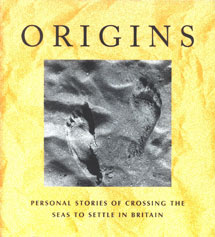
Origins. Read More...
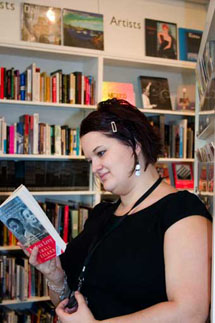
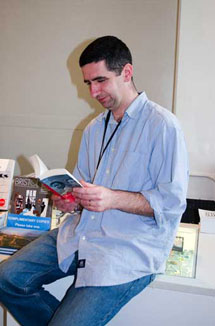
Staff at Arnolfini, Bristol, with the book (Laura Thorne).
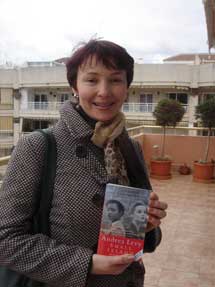
Otilia from Romania.
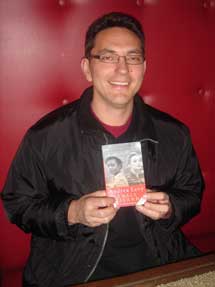
Oskar from Croatia.
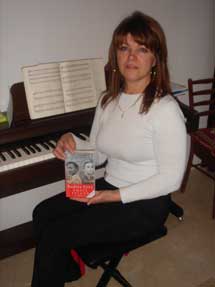
Haline from Ukraine.
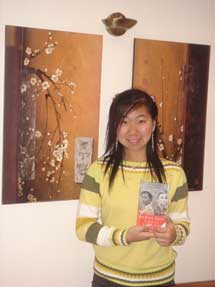
Huiji from China.
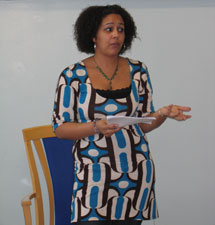
Louisa Parker on launch day. To contribute
to the Dorset Black History Project or for further information
on this initiative, contact Louisa on louisaparker3@hotmail.com.
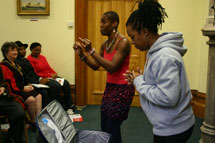
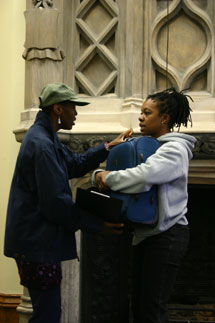
Ruth Pitter and Valerie Mower performing an extract from the
Our Stories Make Waves' assembly on migration at the Bristol launch
(Laura Thorne).
|
|